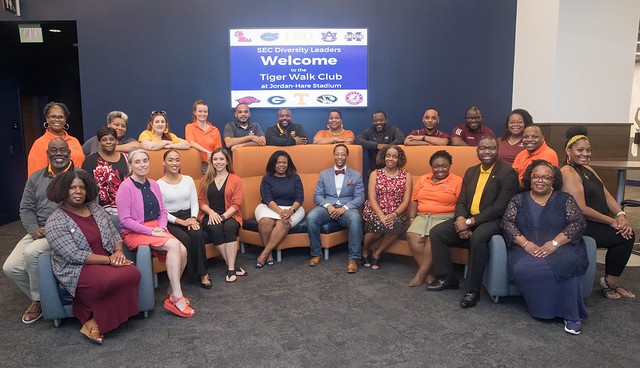Auburn hosts successful Southeastern Conference diversity, inclusion workshop
Article body
Auburn University recently played host to the chief diversity and inclusion officers from the Southeastern Conference, or SEC, for a conference-wide diversity, equity and inclusion professional development workshop.
Hosted by the university’s Office of Diversity and Inclusion, or OID, in late July, the event provided the SEC’s chief diversity officers and their leadership teams opportunities to connect and collaborate with other thought leaders, scholars, researchers and consultants in engaging experiences. The workshop included an appearance from Auburn men’s basketball coach Bruce Pearl and a visit to Jordan-Hare Stadium.
The programming, which included numerous sessions led by SEC university leaders, gave context for interactive discussions on effective ways to strengthen each institution’s existing diversity and inclusion strategies while offering high-quality professional development relevant to all diversity and inclusion roles.
“As senior administrators, each of us is engaged in advancing DEI and inclusive excellence as mission-driven imperatives on our respective campuses,” said Taffye Benson Clayton, associate provost and vice president for inclusion and diversity at Auburn. “This program provides an environment for DEI teams across the SEC to engage in learning, promising practice sharing, strategy development, discussion and networking.
“Our efforts are focused on creating inclusive academic communities where every member can fully engage and flourish. Our mission-minded approach to leading DEI at SEC universities is essential to each institution’s pursuit of teaching, research and service excellence.”
Attendees were joined by two keynote speakers. Daryl G. Smith, a nationally recognized leader in higher education, organizational change management and strategic diversity and inclusion leadership, opened with a presentation titled “Understanding the Fundamentals: How to Have Enduring DEI Impact at Your Institution.” Damon A. Williams, senior research fellow and professor emeritus of education and psychology at Claremont Graduate University, followed with a presentation on what DEI work requires from organization leaders.
In addition to the sessions at Auburn, the group also visited The Legacy Museum and National Memorial for Peace and Justice in Montgomery. Both sites enabled visitors to learn and reflect on the comprehensive history of racial injustices in the United States.
The summer development workshop was one outcome of the chief diversity and inclusion officers meeting in the spring of 2022 at the SEC Office in Birmingham. The senior administrators met with SEC Commissioner Greg Sankey and Birmingham Mayor Randall Woodfin before visiting the Birmingham Civil Rights Institute and Innovation Depot.
Both the summer workshop and spring meeting are outgrowths of the SEC Council on Racial Equity and Social Justice. Established in 2020, the council is tasked with identifying resources and outlining strategies aimed at ending racism and discrimination in intercollegiate athletics. Many of the diversity and inclusion officers work jointly with student-athletes, administrators and head coaches to support the council’s goals.
More information about the conference’s commitment to racial and social equity can be found here.
Related Media
Media interested in this story can contact Communications Director Preston Sparks at (334) 844-9999 or preston.sparks@auburn.edu.
Auburn University is a nationally ranked land grant institution recognized for its commitment to world-class scholarship, interdisciplinary research with an elite, top-tier Carnegie R1 classification, life-changing outreach with Carnegie’s Community Engagement designation and an undergraduate education experience second to none. Auburn is home to more than 30,000 students, and its faculty and research partners collaborate to develop and deliver meaningful scholarship, science and technology-based advancements that meet pressing regional, national and global needs. Auburn’s commitment to active student engagement, professional success and public/private partnership drives a growing reputation for outreach and extension that delivers broad economic, health and societal impact.








